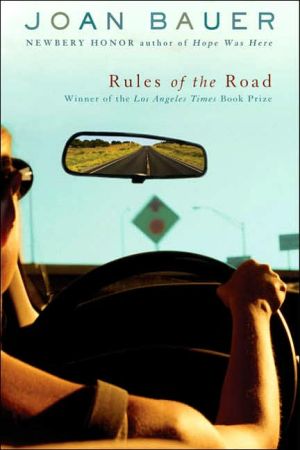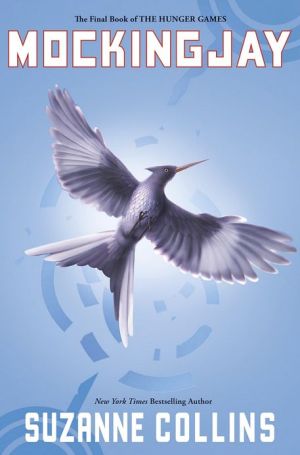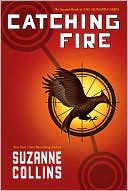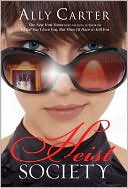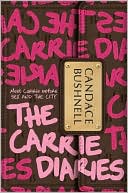Rules of the Road
Meet Jenna Boller, star employee at Gladstone Shoe Store in Chicago. Standing a gawky 5'11' at 16 years old, Jenna is the kind of girl most likely to stand out in the crowdùfor all the wrong reasons. But that doesn't stop Madeline Gladstone, the president of Gladstone's Shoes 176 outlets in 37 states, from hiring Jenna to drive her cross country in a last ditch effort to stop Elden Gladstone from taking over his mother's company and turning a quality business into a shop-and-schlock empire....
Search in google:
FOR USE IN SCHOOLS AND LIBRARIES ONLY. Sixteen-year-old Jenna gets a job driving the elderly owner of a chain of successful shoe stores from Chicago to Texas. Along the way, Jenna hones her talents as a saleswoman and finds the strength to face her alcohoPublishers WeeklyBauer's novel about an earnest teenager who chauffeurs a crabby, wealthy woman has the underpinnings of a quirky Driving Miss Daisy, but the story quickly runs out of gas. Sixteen-year-old Jenna Boller has the world by the tail. She's just received her driver's license and she loves her job at Gladstone's Shoe Store. Even better, she's been tapped to drive Mrs. Madeline Gladstone, the imposing president of the shoe store chain, from Chicago to Dallas for an important shareholders meeting. During the road trip Jenna gets a chance to demonstrate her passion for shoe salesmanship at various Gladstone stores; she also learns of Elden Gladstone's plan to push his mother aside in favor of a major merger. While Jenna educates herself in the ways of big business and dealing with difficult people, she also ruminates about her alcoholic father, her ailing grandmother and her mom and sister waiting at home. She arrives back in Chicago both braver and wiser. As in Squashed, Bauer begins with an intriguing premise, weaves in unusual settings and scenarios and creates an offbeat first-person narrator to relay them. But a supporting cast of stock characters and forced dialogue may disappoint readers of her previous novels. Ages 12-up. (Apr.)
Rules of the Road\ \ By JOAN BAUER \ speak\ Copyright © 1998 Joan Bauer\ All right reserved. \ ISBN: 0-14-240425-X \ \ \ Chapter One\ I leaped onto the sliding ladder in the back room of Gladstone's Shoe Store of Chicago, gave it a shove, and glided fast toward the end of the floor to ceiling shelves of shoeboxes. My keen retailer's eye found the chocolate loafers, size 13, I slid the ladder to the Nikes, grabbed two boxes of easy walkers (white and beige) size 4 1/2 narrow, pushed again to women's saddles, found the waxhides, size 7, rode the ladder to the door one-handed. Children, do not try this at home. I am a shoe professional. I jumped off as Murray Castlebaum, my boss, rushed past me. \ "It's a madhouse out there, kid." Murray grinned, rifling through shoeboxes. We love it when it gets busy.\ I walked quickly back on the sales floor, made eye contact with each of my customers so they'd know I cared. Every movement counts when you're selling shoes, especially when the store fills up with customers. You look at people calmly; you let them know you'll take care of them-you're not panicked even though people are holding up shoes and barking sizes at you all at once. I just remember what Murray told me: People want to know someone's for them. I've sold lots of shoes this way.\ The tired woman with the three screaming boys tried on the waxhide saddles. "Mommy, I want to go!" cried the youngest boy and the other two chimed in. This could blow my sale because she was outnumbered. I took out my stopwatch that I used for emergencies, handed it to the oldest boy.\ "Breath-holding contest," I directed. "The winner gets cow laces. Best two out of three." "Cool." The boys started holding their breath, mere putty in my hands. The woman looked at me gratefully, freed to shop.\ I raced to the older man, slid the loafers on his bony feet, felt the toe. His face went soft. I smiled. These shoes sell themselves. He stood up, did a little dancing movement. Moved to the woman with the dangling Siamese earrings, the pouncing cat pin. Slipped the Nikes on her fat foot, mentioned the tri-density compression plug midsole that would energize her feet on pavement, told her to give them a good test. Circled back around like a good sheepdog, keeping watch. "How are those feeling?" I asked Cat Woman, who grinned. Showed the older man the hand-stitching and richly grained texture on his loafers. Pointed out the classic, yet fresh appeal of the waxhide saddle.\ The woman nodded as her boys argued over who won the contest-she'd take the shoes. The older man took out his wallet. "I'll take them, miss." A yes from Cat Woman. The woman with the toddler I'd waited on earlier bought three pairs of baby sandals in white, pink, and dress black. They can't say no. I walked my customers to the counter, thanked each one, tallied up the five percent commission in my head, keeping my eye on the man and the little girl who just walked in. Murray pushed back his three strands of hair that he tried to comb over his balding head and did his dead chicken imitation, stretching his neck long, bugging his eyes out. This meant I wait on the man and girl. I headed toward them, stepping lightly. "So what are you doing in school these days, Becky?" the man asked the little girl. "Daddy," she said, "I already told you last week." The man checked his watch. A weekend father, probably. Be thankful, Becky. At least yours comes around.\ Becky tried on pink ballet slippers, white cowgirl boots, and black patent leathers.\ She got them all. I walked Becky and her dad to the counter. "Listen," the father said as he flipped out his Visa card. "I'm going to have to take you back early today, Beck. I've got an appointment."\ My dad used to say that to me on the rare occasion that he came around. I handed her a balloon and told her how great she's going to look in her new shoes. Becky stared at the children's shoe display I arranged. Murray said it was my best one yet. It had stuffed clown dolls and circus decals and a wind-up trapeze toy that moved across a wire. The kids always ran to it whenever they came into the store. Becky walked to the display, her little face caved in, watching as the toy man buzzed across the wire above the Keds.\ I wanted to tell her I understood. I walked over to her, put my hand on her shoulder, and settled for one of those looks that passed between strangers. Her father checked his watch again, rushed her out the door. Mrs. Madeline Gladstone, the supremely aged president of Gladstone's Shoes (176 outlets in 37 states; corporate offices in Dallas, Texas), stood by the cash register under the large white five-pointed Lone Star of Texas that was the symbol of Gladstone's Shoe Stores everywhere. She came to our store every day when she was in town. Mrs. Gladstone had houses in Dallas and Chicago, but lately she'd been spending all her time here. She was very short but made up for it like one of those little yippy dogs who barks at anything. She ran her fingers through her coarse white hair, made notes on a pad inside a blue leather folder marked "personal." Some people just naturally make you nervous. She was retiring this year, handing the business over to her son, Elden. Murray said retiring was probably going to kill her because the shoe business had been her whole life. It didn't help that Elden was pond scum.\ He came to the store three months ago, saying how the shoe business was changing and we were going to get new lower-priced merchandise that was going to fly off the shelves. The merchandise came, but it never made it on the shelves. It looked good on the outside, but Murray Castlebaum's got X-ray vision. He looked past the brushed leather and the fancy labels to the thinner soles and the wider stitching and the second-rate lining. Then Murray shoved everything in the closet and stood on the ladder in the back room and gave a misty-eyed speech about how you've got to live what you sell and he wasn't about to start living with garbage. Most people think selling shoes is pretty ho-hum, but if you hang with shoe people long enough you plug into the high drama. I looked around. The crowd had cleared. Customers come in swarms, like locusts.\ "Break, kid." Murray motioned me to the back room. I was fifteen and a half when I started at Gladstone's last year, sophomore year, the year of the Big Slump. I gained seventeen and a half pounds. I went from center forward to second-string guard on the girls basketball team because I just can't jump. I got a C minus in History, which knocked me off the honor roll because my history teacher didn't like my essays or my end-of-the-year term paper ("Our Shoes, Ourselves-Footwear Through the Ages"). I became the brunt of Billy Mundy's mean jokes until I shoved him against the wall when he called me "Ms. Moose" for the zillionth time, told him I'd rip his left kidney out if he said that again. I just limped through sophomore year, all five feet eleven inches of me, wondering why God had invented adolescence.\ But there was Gladstone's. I succeeded here. I made money here. I didn't feel big, awkward, and lost. I felt successful. I helped people. They looked to me instead of away. I couldn't wait to come here after school, couldn't wait to head out to work early on Saturday mornings. My grandmother always said that everyone needs something in life that they do pretty well. For me, it's selling shoes.\ Still, I nearly collapsed during those first weeks wondering how I was going to remember everything. But you know how it is when you start something new; you mess up for a while and then gradually you find the rhythm. Murray Castlebaum's a good, patient boss except when his diverticulitis acts up and then you steer clear because the man becomes Frankenstein, or Frankenbaum, as I call him. At the end of each week, Murray asks me, "Okay, kid, what did you learn?" At first I'd just shrug and say something about handling customers better, but Murray didn't like that because he'd been selling shoes for twenty-three years and figured something big should have rubbed off.\ "The number one thing you gotta know to sell shoes," Murray said, "is that every shoe has a story. You know how it's made, you know how to sell it."\ So I made it my business to know what was good and bad about each shoe. You can put four pairs of sandals in front of me and I can tell you which one to wear on the beach, which one to wear for a walk, which one to buy for the long haul, and which one to avoid altogether. And when it comes to selling sneakers you better have done your homework or you'll get blown out of the water. You sell road traction and heel alignment, and don't let anyone tell you that a cross-trainer is going to give you the strength of a long-distance runner. It's a bold new shoe world out there and not everyone knows how to compete.\ I sat on the folding chair by the helium tank and the boxes of Gladstone's Shoe Store balloons with the Texas star that were blown up and given to every child who walked through the door. I turned the helium gage on, took a quick gulp of funny gas, and squeaked out, "Cat Woman lives." "Watch the gas," Murray said to me, looking through boxes of loafers. I let loose a high-pitched helium giggle, opened my purse, and took out what had become my most prized possession. There it was, nestled between my Chicago Public Library card and my Red Cross CPR certificate-my own, personal driver's license-six months old today. Jenna Boiler Eyes: Brown Hair: Red Height: 5'11" Weight: None of your business\ An official Illinois driver. If only the photo wasn't so awful-my flat nose looked flatter, my round face looked like a globe, my auburn hair hung frizzed and heavy on my shoulders like too much fur. My dark eyes (one of my best features) looked guilty. My sister got the beauty in the family. I got the personality. I held up my license and chirped out, "My passport to new worlds, Murray. Adventure. Romance. Freedom." "The romance dies, kid, the first time you're wedged between two Mack trucks at rush hour on the Eisenhower Expressway." Murray lumbered out as I cradled my license. I was a good driver, everyone said so. Cars never scared me. I had respect for their power, but I worked hard to learn the rules. My big plan at the end of the summer, after clocking in many full-time hours at Gladstone's, is to buy a car-a red one-with a sunroof and leather buckets. Then, I'm going to explore all of Illinois, and then Wisconsin, and then-\ "Where's my Jenna girl?" I froze at the voice coming from the sales floor. It couldn't be. "Jenna girl, this is your father calling you!" I looked for a place to hide. There was no back door. "Sir ..." It was Murray's voice. "We can't have you-" "I'm here, sir," my father announced, drunk, "to see my daughter."\ I couldn't move. Murray, bless him, said, "She's gone for the day."\ "Now don't give me that now." My father swirled the words together. "Just want to see her for a little minute. Haven't seen her for a long time, very long." Two years and seven months, to be exact. But who's counting? Not me. Not anymore. I used to count the letters I sent him that he never answered, the presents I mailed on his birthday and Christmas. I got up from the stool like I was dragging lead weights. I could get another job after they fired me. I was a good worker, everyone said so. I could sell anything to anybody. I stood at the door and watched my father in dirty jeans and an old golf shirt and grubby sneakers scratch his head and fall into a plaid chair as Mrs. Gladstone snapped her long, bony fingers at Murray to do something.\ "Jenna girl! You got tall there." His cloudy eyes tried to focus.\ Please, God, let the helium have worn off. I said, "It happens," but I still sounded like a cartoon mouse. I walked up to Mrs. Gladstone, could smell her light perfume wafting up from her navy blue pin-striped suit. No customers in the store. That was something. I looked her straight in the eye, tried to aim my voice low.\ "I'm sorry about this, Mrs. Gladstone. I'll take care of it." Better, but still Disney.\ Her gray eyes blasted through me. She stood rigidly erect, every thick, snowy curl in place. My face sizzled hot. I walked slowly toward my father, not looking at the mirrors on the blue walls on either side of me, not looking at the white sign above the door, WE'RE NOT JUST SELLING SHOES, WE'RE SELLING QUALITY. I looked at the blue carpet with the white stars, took my father's arm to lead him out of the store, onto the street, somewhere, anywhere but here.\ "Did you miss your old man?" I led him out to Wabash Street, underneath the elevated train tracks. Dad was never a mean drunk, you could put him places, lean him against things and he'd pretty much stay put. That helped when I was smaller and I had to put him places when Mom had had enough. I arranged him on the station steps, put his hands together to grip the rail. I was really glad that I was one of those people who had delayed reactions to trauma. "Well," he blubbered, "watcha been doing?" An El train barreled by overhead, shaking the street. Steel scraping steel, the train screeched around the corner. I gave him two years and seven months worth. "Stuff, you know." The gas had worn off. I'm definitely off helium for good. "Me too." He swayed down on the steps as two old women moved quickly past us. "You probably think I'm drunk, Jenna girl, but I'm not." "Really." He always called me "Jenna girl" when he was plastered. "I'm on medication that makes me ... funny." I focused in hard at the Lemmy's hot dog poster (steaming dog with everything, including grilled onions) so I wouldn't have to look at my father or see the staring people looking at me like I'm some poor, pitiful case.\ Drunken Dad Disgraces Daughter. We stayed there for a while not saying anything. When I was nine, Mom had sent me to a therapist, Ms. Lynch, after she and Dad got divorced so I'd have a place to yell and scream, which I never did. Ms. Lynch had a puppet, a brown furry chipmunk named Chester, that I'd put on my hand and tell him the story of my dad's alcoholism and how I'd never known if he was going to be a good dad one day or a bad one. One time, Ms. Lynch made Chester's voice and said it was okay if I got angry. I got angry all right, but not at Chester. I told Ms. Lynch that Chester was a chipmunk and didn't talk. Then I told her I knew that storks didn't bring babies so stop trying to snow me.\ Dumb as it seems, I could have used Chester now. "I'm going to have to get back to work, Dad." I said this low, mature.\ Dad belched. He was wearing the Timex watch I'd sent him last Christmas. Nice to know it arrived. "Jus wanted to see you, honey. I meant to call." He always said that. "Yeah. I know." I felt the armor going over my heart and mind, the steel rod shooting through my back. I didn't ask where he was working now. The jobs never lasted long. He was always selling something-aluminum siding, screen doors, toasters, used cars-I got my gift for selling from him, that's what people said. He had a brief stint as a door-to-door vacuum cleaner salesman; kept a ball of dirt in his pocket to throw on the carpet when the front door opened; got bit bad by an irritated pit bull who didn't appreciate the Eureka suction. Part of me wanted to walk away and leave him there, the other part couldn't. I'd worked hard at seeing his alcoholism as a disease he was stuck in. Love the person, hate the bad things they do. Sometimes loving from far off is a whole lot easier than eyeball to eyeball.\ "Is there someplace you're staying, Dad? Someplace you need to get to?" He tried standing up to reach in his pocket, fumbled badly, finally pulled a matchbook out, opened the cover, handed it to me. "Sueann Turnbolt, 1260 Wells Street, 555-4286," it read. Another girlfriend probably. "Is she there now, Dad?" "S'waiting for me." Mr. Romance. I hailed a cab, got him inside, gave the driver ten dollars and the address. "We can get together when I'm not working, Dad." "Okey dokey, Jenna girl." I shut the cab door and watched it head down the street. I felt exhausted, like I hadn't slept for days.\ Daddy's home. The last time he showed up was when I was a freshman. I was walking home from school with my friends and he pulled up in a broken-down Dodge, jumped out with a big toothy smile like I should have been expecting him all along. Dad always made an entrance.\ He hung around town that summer, drinking, not drinking, making promises, breaking them.\ Daddy's home. I leaned against the elevated train stairway, closed my eyes, threw back my head. I didn't know if I could handle it this time.\ (Continues...)\ \ \ \ \ Excerpted from Rules of the Road by JOAN BAUER Copyright © 1998 by Joan Bauer . Excerpted by permission.\ All rights reserved. No part of this excerpt may be reproduced or reprinted without permission in writing from the publisher.\ Excerpts are provided by Dial-A-Book Inc. solely for the personal use of visitors to this web site. \ \
\ Publishers Weekly\ - Publisher's Weekly\ A 16-year-old chauffeurs her crabby employer from Chicago to Dallas. "Bauer begins with an intriguing premise, weaves in unusual settings and creates an offbeat narrator to relay them. But a supporting cast of stock characters and forced dialogue may disappoint readers of her previous novels," said PW. Ages 12-up. (Jan.) Copyright 1999 Cahners Business Information.\ \ \ \ \ Publishers Weekly\ - Publisher's Weekly\ Bauer's novel about an earnest teenager who chauffeurs a crabby, wealthy woman has the underpinnings of a quirky Driving Miss Daisy, but the story quickly runs out of gas. Sixteen-year-old Jenna Boller has the world by the tail. She's just received her driver's license and she loves her job at Gladstone's Shoe Store. Even better, she's been tapped to drive Mrs. Madeline Gladstone, the imposing president of the shoe store chain, from Chicago to Dallas for an important shareholders meeting. During the road trip Jenna gets a chance to demonstrate her passion for shoe salesmanship at various Gladstone stores; she also learns of Elden Gladstone's plan to push his mother aside in favor of a major merger. While Jenna educates herself in the ways of big business and dealing with difficult people, she also ruminates about her alcoholic father, her ailing grandmother and her mom and sister waiting at home. She arrives back in Chicago both braver and wiser. As in Squashed, Bauer begins with an intriguing premise, weaves in unusual settings and scenarios and creates an offbeat first-person narrator to relay them. But a supporting cast of stock characters and forced dialogue may disappoint readers of her previous novels. Ages 12-up. (Apr.)\ \ \ Children's Literature\ - Children's Literature\ Jenna Boller, working part-time in high school as a salesman at one of the 176 stores of Gladstone's Shoes, is tapped to also be the personal driver for Mrs. Gladstone. After several weeks of taking her to and from the local store, Jenna is lured into driving her on a scouting expedition for several weeks in the summer, culminating in attendance at the board of directors annual meeting. Jenna revels in her freedom from home and its problems and in the spy mission she executes for Mrs. Gladstone. While Mrs. Gladstone inspects each store, Jenna poses as a customer, later reporting on the quality of both the service of the staff and the merchandise. Both of them are deeply concerned for the future of the business, fearing that the son, Elden Gladstone, is posturing to take over the company and sell the name to a competitor. As the two attempt to stop the shady business dealings, Jenna learns about trust, her own inner strength, and how to face her family concerns. Nominated for the Maryland Black-Eyed Susan Award 2000-2001. 1998, Scholastic, Ages 12 up, $16.99 and $4.99. Reviewer: Mary Sue Preissner—Children's Literature\ \ \ \ \ Children's Literature\ - Rebecca Joseph\ Sixteen-year-old Jenna is a new driver with a talent for selling shoes. When Madeline Gladstone, the elderly owner of Gladstone Shoe Stores, hires Jenna to chauffeur her around the country, Jenna begins a summer-long adventure which includes trying to handle the unwelcome visits of her alcoholic father and trying to help Mrs. Gladstone save her company. Bauer has created a fascinating, believable cast of characters in this riveting novel.\ \ \ \ \ VOYA\ - Candace Deisley\ Here is the book that has everything: good writing, humor, moral enlightenment, and above all, sole! Jenna works part-time at an old-fashioned store in Chicago-the kind that sells quality shoes and has someone helping customers find the right fit and form for the function. Having got her driver's license six months ago, Jenna is new on confidence. Now she has caught the eye of the elderly widow, Mrs. Gladstone, who with her husband founded the shoe store chain and built its reputation on selling a quality product with quality service. When Mrs. Gladstone is threatened by a takeover from her son, whose values are not the same as his parents', in hopes of thwarting his plans she decides to visit some of the stores in the chain, on her way to see her best salesman in Texas. She hires the inexperienced Jenna to drive her Cadillac, visit the stores, and spy on management. These experiences are at the same time laugh-out-loud funny and lessons in morality. When Jenna and Mrs. Gladstone get to Texas, Jenna meets Harry Bender, no. 1 salesman and twenty-year member of Alcoholics Anonymous. She bonds with Harry, wishing that her alcoholic father were more like him, or that Harry were her father. But their bond is shattered when Harry is killed by a drunken driver. On returning to Chicago, Mrs. Gladstone loses the takeover but maintains a lot of influence, and Jenna delivers her father, drunk and driving, to the police. This is a remarkable book, presenting lessons of respect for others, courtesy, and honesty gently but persistently. Its messages about values and self-esteem bring laughter and tears. A sure-fire hit! VOYA Codes: 5Q 4P S (Hard to imagine it being better written, Broad general YA appeal, Senior High-defined as grades 10 to 12).\ \ \ \ \ Children's LiteratureJenna Boller can sell shoes like a skilled physician serving the physical and mental needs of a waiting room full of people. In this wry, coming-into-her-own novel, a young woman discovers her own beauty and skills when she agrees to drive an aging shoe mogul on the last tour of stores before retirement. Even though she is faced with the difficulties of living with a loving but often absent alcoholic father and the awkwardness of being a tall late-bloomer, Jenna has a keen sense of observation and a great sense of humor. Readers will love going along for the ride in this insightful road-trip novel. 2000 (orig. 1998), Puffin, $4.99. Ages 10 up. Reviewer: Alexandria LaFaye\ \ \ \ \ KLIATTTo quote KLIATT's Sept. 1998 review of the hardcover edition: Sixteen-year-old Jenna feels successful only when she's at work at her part-time job at Gladstone's Shoe Store. The rest of the time she feels "big, awkward, and lost." She's had a lousy year at school and on the basketball team and there are family problems—a divorced mother who works too hard, a more beautiful younger sister and especially an alcoholic father who drops in and out of her life and makes trouble. When the elderly but feisty president of the shoe store company hires Jenna to drive her from Chicago to Dallas, she's happy to get out of town. On the road with Mrs. Gladstone in her big white Cadillac, Jenna learns a lot about standing up for herself and for what's right, wisecracking all the way, while Mrs. Gladstone learns to stand up to the son who's trying to force her to retire. Jenna is a delight; she's direct, funny, and self-deprecating as she relates the events of her summer on the road. Her enthusiasm for selling shoes is charming, and she comes across as utterly believable. Readers will cheer her on as she gets up the nerve to help the ornery Mrs. Gladstone and confront her father at last. This will probably appeal more to female than to male readers, but both Jenna and the novel are real winners. Bauer, author of Squashed and other YA novels, has a knack for conveying serious messages in a humorous way. An ALA Notable Book, Best Book for YAs, and Quick Pick; winner of the 1998 LA Times Book Prize. KLIATT Codes: JS*—Exceptional book, recommended for junior and senior high school students. 1998, Penguin/Puffin, 202p, 18cm, 97-32198, $4.99. Ages 13 to 18. Reviewer: Paula Rohrlick; May2000 (Vol. 34 No. 3)\ \ \ \ \ School Library JournalGr 7 UpJenna Boller, 16, has had a lot of practice at being responsible. Her mother is a nurse who works the night shift, and her younger sister yearns for attention. Jenna's long-divorced, alcoholic father embarrassingly shows up whenever he gets an occasional urge to "make it up" to her. In addition, her wise and beloved grandmother is grappling with Alzheimer's disease. So the teen's mother reluctantly agrees to let her accept a summer job driving the elderly Madeline Gladstone, the crusty and demanding president of the shoe chain for which Jenna works, from Chicago to Texas. Jenna is surprised to learn that Mrs. Gladstone has problems, too: an aching hip as well as an aching heart. Her conniving son is maneuvering to take over the company and sell out for a huge short-term gain. Jenna comes to admire and love her boss and eagerly enters into an alliance of loyal employees to save the company. In making this valiant attempt, she finds herself truly transformed. Bauer's juxtapositions are invitingyouth and age, wealth and work-a-day struggle, big-city loneliness and big-state caring, practicing alcoholism and big-hearted sobriety, stockroom wisdom and boardroom chicanery. The author creates some fabulous and sometimes flamboyant characters, witty dialogue, and memorable scenes, thus making readers really care about the intricacies of matching shoes to people and finding the right focus for Jenna as she strives to meet tall goals. Bauer's best yet.Cindy Darling Codell, Clark Middle School, Winchester, KY\ \ \ \ \ Kirkus ReviewsA high-school student with a passion for selling shoes may be a hard sell to teenagers, but Bauer (Sticks, 1996, etc.) makes 16-year-old, too-tall Jenna Boller a convincing narrator in this story of love and loss in the shoe business. President and owner of shoe stores from Chicago to Texas, the elderly Mrs. Gladstone appoints Jenna, who works in one of the stores, her personal driver. As the Chicago skyline recedes, Jenna and her companion head for the Lone Star state and a stockholders' meeting, taking in shoe stores from Peoria to Little Rock, where Mrs. Gladstone uncovers not only a decline in the quality of shoes being sold, but her son's plot for a company takeover. Sharp dialogue and caustic commentary from Jenna mark the journey, which lags somewhere around Kansas; revitalizing the plot is the entrance of Harry Bender, world's greatest shoe salesman. Through him and others, Jenna learns much more than the rules of the road ("Never eat at a place called MOM'S, because it's a safe bet Mom's been dead for years") and business acumen. Jenna's alcoholic father hovers in the background, more plot manipulation than fully realized character, but his presence throws Jenna's new maturity into relief. It's an unlikely hero's journey, and Bauer's dry humor assures readers that all's well that ends wellif not in corporate takeovers, at least in the business of growing up. (Fiction. 12-15)\ \
